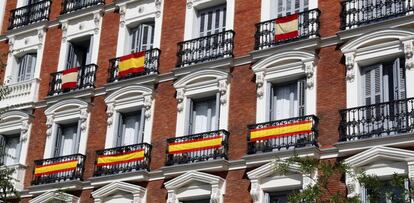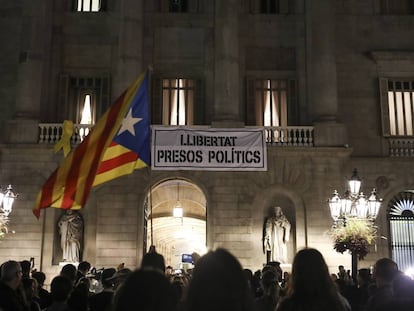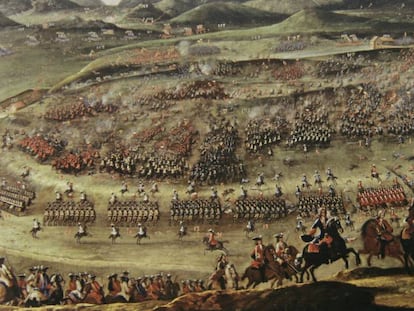¡°Catale?os¡±: The emotional tsunami of Catalans living in Madrid
They built new lives in the Spanish capital, but are now caught between two worlds on the issue of secession

It might be necessary to come up with a new term to define the administrative and even emotional situation of Jordi Comellas, Montserrat Abell¨¢, Xavier Saludes and Jordi Penas.
Perhaps ¡°Catale?os¡± would fit the bill. Or maybe ¡°Madrilans.¡±
In any case, they are Catalans who have been living in Madrid for years. In Catalonia they are viewed as Madrile?os, especially at a time when social polarization over independence ¡°makes anyone with a balanced outlook something of a dissident.¡±
Madrid is my home. To me, it¡¯s always been a welcoming city
Jordi Penas
The speaker is Jordi Penas, 42, who works at the Prado Museum as an exhibition coordinator and whose wife is from Madrid. Their relationship has not been affected by the fallout of the independence push, and he has hardly experienced any hostility over the issue, even though he supports secession from Spain. He also takes a humorous approach to all the Spanish flags adorning the capital¡¯s balconies these days.
¡°Madrid is my home. To me, it¡¯s always been a welcoming city. Cases of rejection are really residual,¡± he says. ¡°This is an open capital. I can talk at ease here. Perhaps even with more perspective than I would in Barcelona.¡±
Xavier Saludes, 47, agrees. He arrived in Madrid in 1990 because his father was transferred there by savings bank La Caixa. He studied political science, but now runs a trendy eatery on Cava Alta street, in Madrid¡¯s popular La Latina district. The name of the place is Matritum ¨C Madrid in Latin ¨C and today the wine cellar is hosting a gathering of Madrid-based Catalans to discuss their experiences as ¡°expats.¡±

The group includes Jordi Comellas, a 51-year-old musician who specializes in the Baroque period, and Montserrat Abell¨¢, a 41-year-old master baker whose two children were born in Madrid, speak Catalan, and are very worried about the political crisis.
¡°It¡¯s complicated. You try to explain it naturally to them, just like when they ask about sex,¡± says Abell¨¢, whose kids are 10 and seven. ¡°You avoid the details and try to be very sincere. You tell them that part of the population wants to become independent. And then they ask you ¡®What about my grandparents? Won¡¯t they be able to come? Will they need a passport?¡¯ They are little and they don¡¯t understand. And I don¡¯t let them watch the news because they get all anxious.¡±
¡°It was I who one day asked my youngest child what was going on,¡± explains Jordi Comellas, who has two daughters and whose wife is Catalan. ¡°And she replied: a tsunami. And she was right. For those of us who are here, it feels like an emotional tsunami, like something very big is happening. And it feels like there¡¯s nothing we can do to avoid it, beyond feeling sad, as we all feel, and anxious about the way the mood is changing. We have discovered that everything could very well go to hell.¡±
I have chosen prudence in my relations with friends and relatives
Xavier Saludes
There are approximately 26,000 Catalans on Madrid city registers, although the real figure could well be three or four times that. Jordi Penas arrived here 12 years ago, and says he is amazed at the speed and intensity with which the separatist cause has grown.
¡°A decade ago, it was unthinkable that I might vote in an independence referendum. Yet I did so on October 1,¡± says Penas. ¡°I¡¯m aware that the legal guarantees [for a valid referendum] weren¡¯t there, but it was a political gesture and I wanted to be a part of it. Feelings have intensified, and two things can now happen: either separatism will pick up speed, or disenchantment will bring it to a halt.¡±
This disillusionment would be a result of the tremendous pace that Catalan leaders have set for the breakaway process. All the members of the group that sat inside Matritum, sharing Catalan butifarra sausage, agreed about the need to negotiate a referendum, and about the relevant role that young people will play in the coming years.
¡°We¡¯re all seeing it now,¡± says Xavier Saludes. ¡°Youths, teens are joining a changing mentality that is going to give wings to the separatist movement. There is no doubt about that. That is why the Spanish state should have a plan. I don¡¯t know what that plan should be, but there needs to be an answer, maybe a federated formula of some kind. I am very Catalanist but not at all separatist, and I am starting to feel a little bit alone on this. It would seem that secessionism has come out of the closet.¡±
Staying put
Montserrat Abell¨¢ has no plans to move. Her seven-year-old is a fan of Real Madrid; he speaks Catalan and also Spanish, as his father hails from Segovia. They¡¯ve never had any trouble at school. Neither has Saludes¡¯ 17-year-old daughter Ariadna, whom people refer to as ¡°the Catalan¡± even though she was born in Madrid.
¡°I have chosen prudence in my relations with friends and relatives,¡± explains Saludes. ¡°You come to realize there is a heated atmosphere. WhatsApp groups are conveying a very unsettling picture of events. And I think it¡¯s worth it to put this tension in perspective, because what the separatist process is doing, more than deteriorating political life, is deteriorating interpersonal relationships.¡±
¡°It¡¯s true,¡± confirms Comellas. ¡°The culture of post-truth is taking hold. There are WhatsApp groups that feed back into themselves with fake news. The information jumps from one chat group to the next. And it¡¯s not all coming from the separatists. In Madrid I have friends who are less understanding and who resend one another the same kind of jokes, the same memes, the same boutades. There are parallel realities that don¡¯t let you think and poison your relationships.¡±
Jordi, Montserrat, Jordi and Xavier are aware that they are hybrid citizens. They were shocked by scenes of police violence on October 1, but they also feel disconcerted by the democratic aberrations perpetrated by secessionist leaders. None of them would venture to say whether Catalonia will still be a part of Spain by 2038. In any case, it¡¯s going to be hard getting them to move from Madrid.
English version by Susana Urra.
Tu suscripci¨®n se est¨¢ usando en otro dispositivo
?Quieres a?adir otro usuario a tu suscripci¨®n?
Si contin¨²as leyendo en este dispositivo, no se podr¨¢ leer en el otro.
FlechaTu suscripci¨®n se est¨¢ usando en otro dispositivo y solo puedes acceder a EL PA?S desde un dispositivo a la vez.
Si quieres compartir tu cuenta, cambia tu suscripci¨®n a la modalidad Premium, as¨ª podr¨¢s a?adir otro usuario. Cada uno acceder¨¢ con su propia cuenta de email, lo que os permitir¨¢ personalizar vuestra experiencia en EL PA?S.
En el caso de no saber qui¨¦n est¨¢ usando tu cuenta, te recomendamos cambiar tu contrase?a aqu¨ª.
Si decides continuar compartiendo tu cuenta, este mensaje se mostrar¨¢ en tu dispositivo y en el de la otra persona que est¨¢ usando tu cuenta de forma indefinida, afectando a tu experiencia de lectura. Puedes consultar aqu¨ª los t¨¦rminos y condiciones de la suscripci¨®n digital.










































